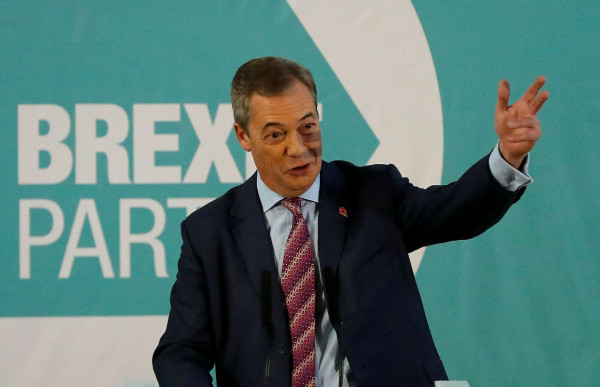

Mr Farage, who is the leader of the Brexit Party and also an MEP, announced today (November 11) his party would not stand for election in any of 317 seats won by the Conservative Party in the 2017 general election.
He had previously promised to fight 600 seats at the election but told a press conference he had decided to “put country before party” through this “Leave alliance”.
Mr Farage tweeted: “This ensures that this general election will not result in a hung parliament and second referendum.
“We will target Labour and remainer MPs and get a voice in Parliament to make the prime minister keep his promises.”
The move is good news for the Conservatives, who will no longer have to split the ‘Leave vote’ with the Brexit Party in key constituencies.
But it also increases the likelihood of a majority parliament which in turn has helped stability forecasts and therefore, the pound.
When the markets opened this morning the pound-to-dollar exchange rate sat at 1.278 but has since bounced to 1.287. Meanwhile, against the euro the pound has risen to 1.166, up from 1.159 this morning.
Adrian Lowcock, head of personal investing at Willis Owen, said: “The announcement by the Brexit party that it will not stand against the Conservatives is being well received by investors, with the pound in particular rallying sharply.”
However he added there was still a “long way” to go in the election campaign and warned investors to be prepared for further volatility in the markets, to ignore the short-term and have a portfolio capable of protecting and profiting from a range of outcomes.
Last month advisers said certainty was the most important outcome of the December election as instability was causing problems for the economy in general, consumer confidence and any forward planning they were trying to do for their clients.
There was further good news on the UK economy this morning when official data showed it grew 0.3 per cent in the third quarter of the year.
This meant the UK avoided a potential recession (as Q2 of this year experienced negative growth of -0.2 per cent) but when compared with the same quarter a year ago, UK GDP only grew by 1 per cent — the slowest year-on-year growth since Q1 2010.
According to the ONS the service and construction sectors provided positive contributions while output in the production sector was flat.
Private consumption, government consumption and net trade also contributed positively to GDP growth.
imogen.tew@ft.com
What do you think about the issues raised by this story? Email us on fa.letters@ft.com to let us know.




